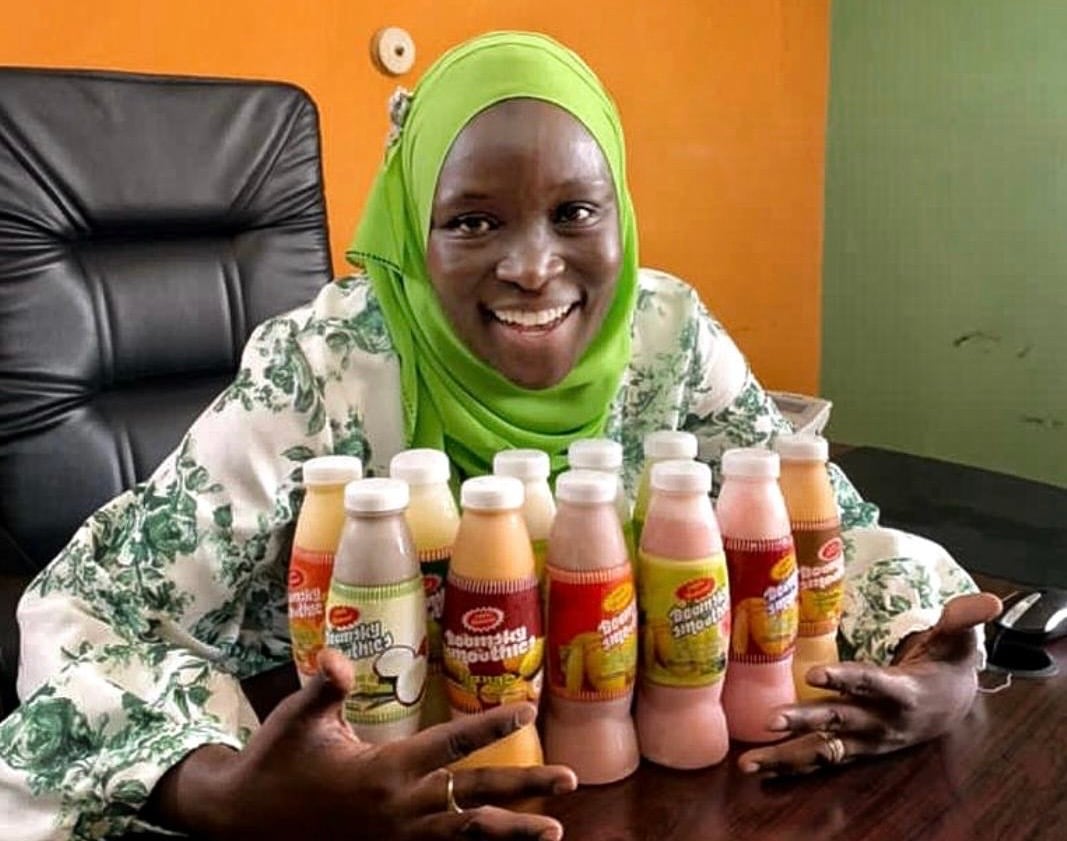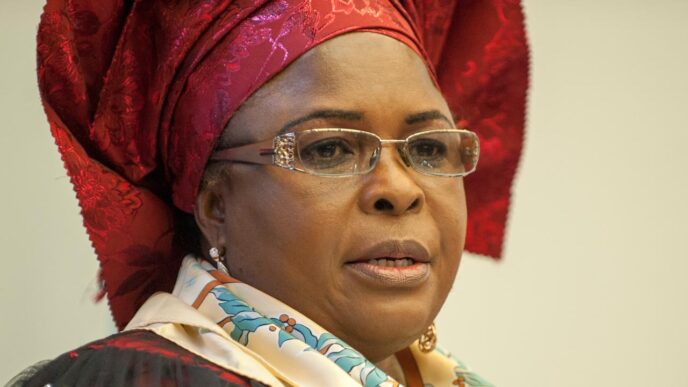Olubunmi Otufowora
After 14 years in the telecommunications industry, Olubunmi Otufowora, chief executive officer (CEO) of Boomsky Smoothies, took a bold leap, leaving her corporate career to turn a pregnancy craving into a thriving business. What started with just N3,000 in her kitchen has grown into a structured brand in Nigeria’s fast-moving consumer goods (FMCG) sector, supplying supermarkets and restaurants.
In this interview with TheCable’s ADERONKE ONI, she discusses her unexpected journey into entrepreneurship, the challenges of scaling a business in Nigeria, and how Boomsky is navigating economic reforms while eyeing expansion into Africa.
TheCable: From studying pharmacy to working in a telco, then quitting to start a smoothie business, how did you get here?
Otufowora: I never planned to start a smoothie business. I was on a corporate career path, working for a telecommunication company and expecting steady growth, but life had different plans for me.
Advertisement
It all began when I became pregnant and craved blended fruit. At that time, I did not even know they were called smoothies. I started mixing various fruit combinations and taking them to work. My colleagues took notice and became curious. They asked me to prepare smoothies for them as well.
Initially, I was pleased to assist, but it soon became overwhelming. I invested a considerable amount of time and money making smoothies for my friends, so they decided to pay me for my smoothie.
With just N3,000, I officially started my smoothie business from my kitchen. What began as a simple craving grew bigger than I expected, and that was how my smoothie journey began.
Advertisement
TheCable: You quit telecoms after 14 years and as head of a company’s unit to focus on Boomsky. What informed this decision?
Otufowora: As I said, I started my business in my kitchen with just N3,000, and it has grown into a real business that I can no longer run part-time.
I had to be honest with myself. Was I fully committed to my job and my business? I felt overwhelmed, and I knew I had to make a change. I could either stay safe in my corporate job or take a risk and fully invest in Boomsky.
This journey is not just about making smoothies; it is about creating something meaningful that can help others and grow beyond me. So, with both fear and excitement, I quit my job in telecommunications and decided to focus completely on being an entrepreneur.
Advertisement
I don’t regret resigning from the telco industry. It was a planned exit. Although it has been challenging, I don’t regret leaving.
TheCable: What has changed in terms of products, sales, workforce and business in general?

Otufowora: Everything has changed since Boomsky Smoothies first started. Initially, it was just me — one person blending fruit in my kitchen, pouring smoothies into unlabelled bottles, and personally sourcing for customers. It was a simple operation with no structured processes, no branding, and no team — just pure passion and a drive to meet demand.
Fast forward to 14 years, and Boomsky has transformed into a fully structured business with a presence in the FMCG space. Our production processes have evolved from manual to automated systems, significantly improving efficiency and quality. What started as a direct-to-consumer business has expanded into a business-to-business (B2B) model, with restaurants and supermarkets as our major partners.
Advertisement
Beyond our products, our workforce has also grown tremendously. From being a one-woman operation, we now have a team of about 30 permanent staff, with over 100 more individuals benefiting directly from our value chain — from suppliers to distributors.
TheCable: As of 2021, Boomsky was in 13 supermarkets. Has that changed, and how did you convince the outlets to stock your products?
Advertisement
Otufowora: Since 2021, we have increased our presence in more stores. This has helped us become a trusted brand in healthy beverages.
Getting stocked in supermarkets is not a one-size-fits-all process. Each store has its own requirements, and the journey varies depending on the retailer. The easiest path is when store management is already familiar with our brand, either through word of mouth or because customers have been asking for our products. In such cases, onboarding is smooth, and we get stocked with minimal effort.
Advertisement
However, the more challenging path involves stores with long and tedious approval processes. Some require extensive documentation, product testing, and, in some cases, board-level approval before we can supply them. In these situations, resilience and patience are key. I have learned to stay persistent, follow up consistently, and demonstrate the value Boomsky Smoothies brings to their shelves until we finally secure the partnership.
Ultimately, it is about building relationships, proving the quality of our products, and staying committed to the process no matter how long it takes.
Advertisement
TheCable: Some suppliers have challenges getting their revenue from supermarkets after partnering; have you experienced this?
Otufowora: Yes, I have faced this challenge. Many suppliers run into this issue after partnering with supermarkets. Sometimes, delayed payments show that the supermarket has cash flow problems, making it hard for it to pay its outstanding invoices on time.
Other times, the delay is caused by internal processes, like slow approvals or inefficiencies in their payment system.
In these situations, patience and persistence are key. We had to create strategies to manage our cash flow while keeping our business sustainable, even when payments were late. Keeping open communication with the stores’ management and having a clear follow-up system also helps reduce these challenges.
TheCable: For entrepreneurs, challenges do not end; what differentiates the ones you face now from the early stage of your business?
Otufowora: Challenges are constant in entrepreneurship. It is the very nature of the job. An entrepreneur’s primary role is to solve problems, so facing obstacles is not a surprise. It is part of the journey.
The difference between the challenges I faced in the early days of Boomsky and the ones I deal with now is not necessarily the type of problems but rather their magnitude. In the beginning, the issues were more operational — how to get customers, how to produce efficiently with limited resources, and how to establish a brand presence. Now, the stakes are higher.
The challenges have grown in scale, affecting larger production volumes, wider distribution networks, and more complex financial and strategic decisions.
Another major shift is people management. When I started, it was a one-person operation. Today, with a larger team, leadership, team dynamics, and maintaining company culture have become very important aspects of my role.
Managing people effectively, ensuring motivation, productivity, and alignment with the company’s vision is an ongoing challenge that requires continuous learning and adaptability.
TheCable: How have FG’s economic reforms affected your business, and how have you been able to stay afloat amid the impact?

Otufowora: The government’s economic reforms have significantly impacted businesses, and Boomsky is no exception. Like many other companies, we have had to adapt to rising costs, shifting market conditions, and overall economic uncertainty.
On the positive side, some of these reforms have encouraged local production and entrepreneurship, creating opportunities for businesses like ours to scale. Additionally, government initiatives supporting SMEs have also provided avenues for growth.
One of the biggest adjustments we made was restructuring our workforce. Instead of keeping everyone as permanent staff, we had to downsize certain roles into temporary or project-based positions. This means bringing people in when needed rather than carrying a heavy payroll all year round. It was not an easy decision, but keeping the business running efficiently was necessary.
We have also had to adjust our pricing to reflect rising production costs. While we always aim to keep our products affordable, raw materials, logistics, and operational expenses have all increased. Rather than compromise on quality, we have been strategic about necessary price adjustments while ensuring we still provide value to our customers.
Expanding our market reach beyond Lagos was another key move. We have extended our supply partnerships to Abuja, Port Harcourt, Benin City, and Sango Ota in Ogun state. By tapping into new customer segments and strengthening our B2B partnerships, we have managed to maintain stable sales despite economic fluctuations.
We also prioritise local sourcing whenever possible to reduce dependence on imports and shield ourselves from the impact of exchange rate volatility. This shift helps us manage costs better, support local suppliers, and strengthen the economy.
TheCable: FG pushed for CNG adoption to reduce costs. As a business owner who delivers products with buses, have you started embracing it?
Otufowora: We have not implemented CNG adoption in our company yet because we believe in using our vehicles as designed by the manufacturer. While the shift to CNG has cost-saving benefits, we prefer to maintain the integrity of our current fleet rather than modify them.
However, as we expand, we are open to investing in buses designed explicitly for CNG. This way, we can explore the benefits of the transition while ensuring efficiency and safety in our logistics operations.
TheCable: Are you looking to raise funds through equity or loans to mitigate rising operational costs and expand your business?
Otufowora: We are not actively seeking to raise funds through equity or loans. However, I am open to considering equity, not merely for financial reasons. I am searching for a strategic equity partner who can facilitate expansion into new markets, enhance our distribution network, and aid in scaling Boomsky to its full potential.
For us, the right partnership goes beyond capital. It is about aligning with a partner who brings industry expertise, network, and strategic value to accelerate our growth meaningfully and sustainably.
TheCable: Boomsky is not the only smoothie business in the space; are there plans to acquire competitors to increase your market share?
Otufowora: We are focused on expanding Boomsky Smoothies rather than acquiring competitors. However, if an attractive acquisition opportunity that aligns with our vision and provides significant value arises in the future, we may consider it. For now, our priority is to pursue organic growth and strengthen our market presence.
TheCable: With over 14 years in this business, are you looking to expand beyond smoothies?
Otufowora: For now, our focus remains on smoothies and juices, and we are committed to strengthening and expanding within this space. However, business is dynamic, and while I can only speak for today, the future may bring new opportunities. If the right expansion fits our vision and market needs, we will be open to exploring it.
TheCable: Are there plans to extend Boomsky’s footprint beyond Nigeria to take advantage of the AfCFTA?
Otufowora: Our vision is to become the preferred fruit drink brand in Africa, and we see the AfCFTA as a great opportunity to achieve that goal. Right now, we are focusing on growing our presence in Nigeria. At the same time, we are looking for ways to expand into other African markets through partnerships.
The border closures did not directly impact our business, as most of our raw materials are sourced locally. However, reopening the borders presents potential opportunities for expansion into new markets. With improved trade access, we can explore cross-border distribution to scale Boomsky beyond Nigeria.
TheCable: How can the government assist businesses like Boomsky?
Otufowora: For businesses like Boomsky Smoothies to thrive, government support is crucial in several areas. First, providing access to low-interest loans and grants would enable small and medium-sized enterprises (SMEs) to scale production, enhance infrastructure, and expand into new markets.
Additionally, improving infrastructure, such as stable electricity, better road networks, and efficient transportation systems, would help reduce operational costs and streamline distribution.
The federal government can also support business growth and competitiveness by offering incentives like tax breaks and import duty waivers on essential equipment. Creating a more business-friendly environment would further accelerate expansion.
Add a comment












